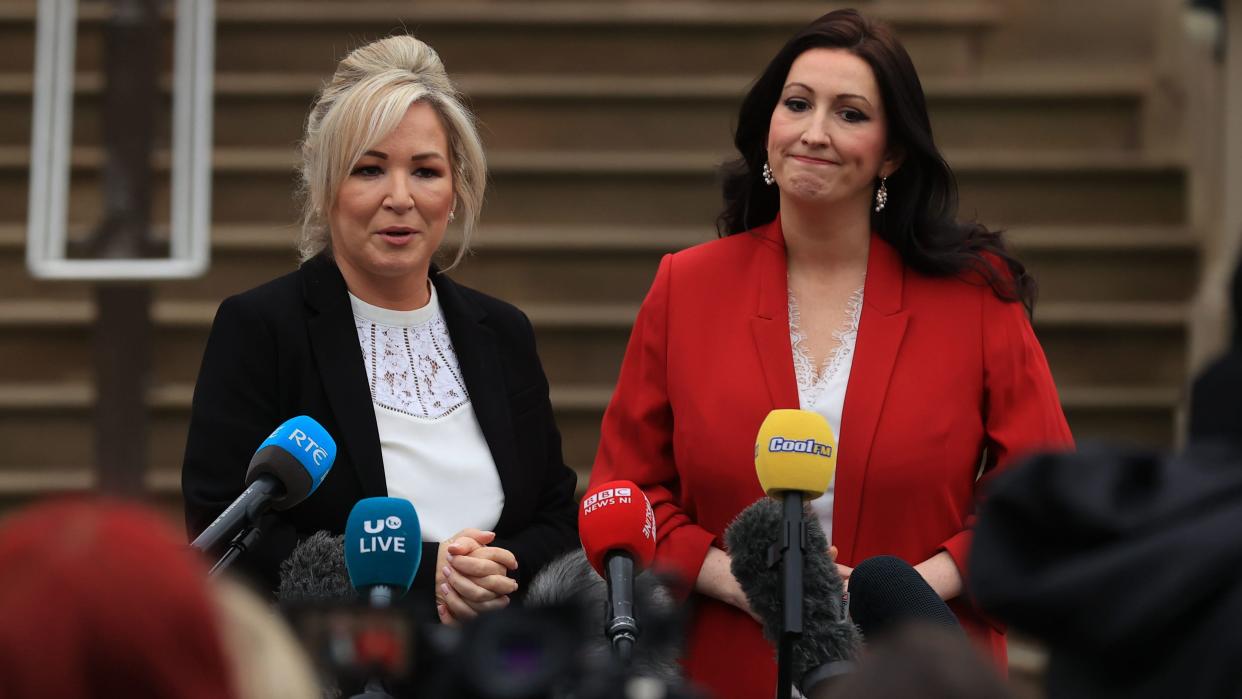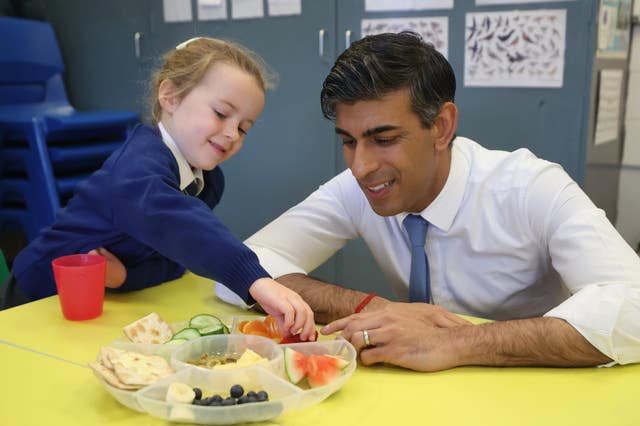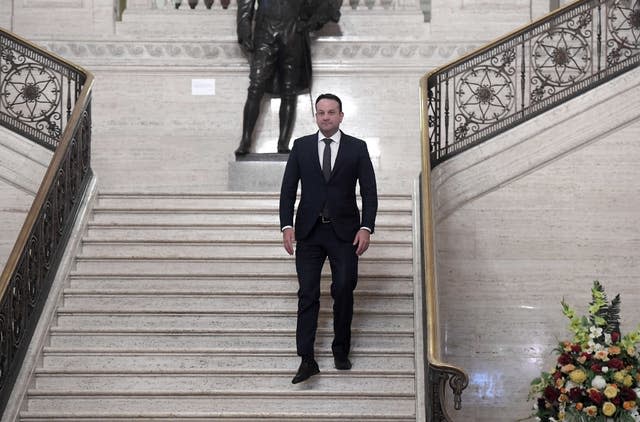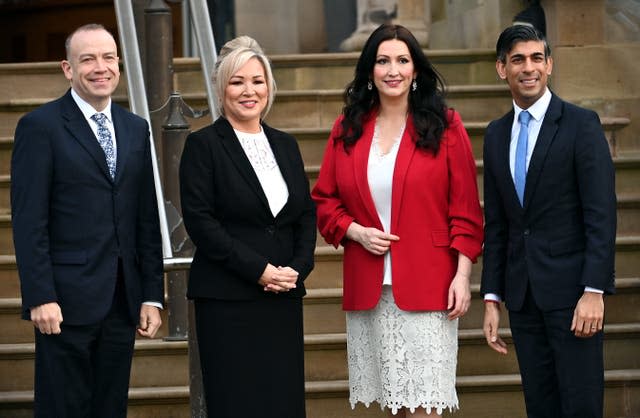Stormont leaders pledge united front in push for more funding from UK Government

Stormont’s new leaders have vowed to work in unity to press the UK Government for more funding to tackle the long list of problems facing public services in Northern Ireland.
The region’s first ever nationalist First Minister, Sinn Fein’s Michelle O’Neill, and her DUP counterpart, deputy First Minister Emma Little-Pengelly, were commenting after meeting Prime Minister Rishi Sunak and Irish premier Leo Varadkar on a day when Stormont’s new ministerial Executive got formally down to business.
The powersharing institutions were restored on Saturday after a deal between the UK Government and the DUP to address unionist concerns over post-Brexit trading arrangements, which included passing new legislation at Westminster.
Ms O’Neill said she and Ms Little-Pengelly had put on a “united front” as they delivered a loud and clear message to Mr Sunak on Monday that a £3.3 billion Treasury package to accompany the return of devolution was not sufficient.
Ms Little-Pengelly said securing enough money to meet the pay demands of striking public sector workers was a key ask of the Government.
The ministers conducted their first joint press conference ahead of convening a meeting of the new Executive at Stormont Castle.
Earlier in the day, all the Executive ministers gathered at the castle for separate meetings with Mr Sunak and then Mr Varadkar.
While the Prime Minister has said the £3.3 billion offer represents a “generous and fair settlement”, Stormont ministers have collectively penned a letter to the Government insisting it is not enough to deliver “sustainable public services and public finances”.
They say more money, along with further reform of the funding model for the region, is required if they are to get on top of a bulging in-tray following two years of political impasse in Northern Ireland.
Earlier, Taoiseach Mr Varadkar insisted the Irish government was willing to help Northern Ireland with further financial support.
Ms O’Neill said the Executive needed more money to deliver good public services.
“The offer that has been put on the table sounds good on the face of it, but whenever you break it down into the details there’s a lot more to be done here,” she told reporters.
“If we’re going to be successful politically, we need to also have the resources to deliver good public services.
“I think the Prime Minister heard that very loudly and clearly from both Emma and I collectively, and from all Executive colleagues.”
She added: “We are not working on failure, we are working on the basis that we are going to be successful.
“We know we’ve a lot of work to do but we need the Treasury to be engaged with us because for many, many years we have been underfunded, we now are trying to fix that, we want to transform our health service.
“We have an in-tray as long as your arm in terms of the issues we need to deal with.”
Ms Little-Pengelly said Executive ministers had to work together to meet Northern Ireland’s financial challenges.
“Within every department there are very important issues,” she said.
“But the key thing here is we are only going to find resolutions for those by working together and working constructively together.
“That’s what we’re up for, I think the rest of the Executive is up for that challenge.”
The DUP MLA added: “We know that there’s a very clear expectation of delivery, we want to deliver, we need to fix our public services, we need to help those people who are struggling at the moment in terms of getting access to those necessary public services.
“So we took the opportunity this morning to raise that issue directly with the Prime Minister. I welcome the fact that the Prime Minister has indicated that he will continue with those conversations, that those will be detailed conversations around issues such as the fiscal floor and public sector pay.”
Prior to their meeting with Executive ministers, Mr Sunak and Mr Varadkar met for private discussions at Stormont.

However, they did not conduct any joint meetings with local politicians or hold a joint press conference through the course of Monday.
The lack of a side-by-side public appearance fuelled talk of tensions in the Anglo-Irish relationship following Ireland’s move to launch a legal challenge against the UK Government’s contentious legislation to address the legacy of the Northern Ireland Troubles.
Both sides moved to play down suggestions of a rift between them.
During his individual press conference at Stormont, Mr Varadkar highlighted that the Irish government had already invested millions of euros in projects in Northern Ireland that had a cross-border element, and he said more funding pledges through its Shared Island Initiative would be forthcoming.
The bulk of Irish investment in the region has focused on capital infrastructure projects.
The Taoiseach, addressing reporters in Parliament Buildings in Belfast, said he was confident the new administration in Belfast would last.

“I want to thank people who made today possible, to congratulate the First Minister, the deputy First Minister, the new Executive on taking up their new roles, and really pledge to do everything that we can do to help this Executive to be successful,” he said.
“There’s a lot of everyday issues that need attention here in Northern Ireland, and I know they’re going to work very hard on that. We’re keen to get north-south co-operation going again and have a meeting of the North South Ministerial Council in the next couple of weeks and focus on some of that practical co-operation that works well for everyone on the island.
“So, very keen to work with a new Executive and looking forward to doing that.”
Asked by reporters if his government was prepared to offer “new” money to the region, the Taoiseach said: “Yes, we are. You know the Shared Island Fund is there and we would intend to make further allocations from that over the course of this year. But we’re also very keen to co-ordinate that with the Secretary of State (Chris Heaton-Harris) and also with the Executive, now it is up and running.”
Mr Sunak said his Government’s funding deal for Northern Ireland was “significant and generous” and would focus on “long-term sustainability” as well as addressing the immediate issues.
He added: “I had very constructive meetings this morning with the Executive, with political leaders across Stormont, and it is a historic and important day for the country, because Northern Ireland’s politicians are back in charge, making decisions on behalf of their people, which is exactly how it should be.

“Now, our new deal gives them more funding and more powers than they have ever had, so they can deliver for families and businesses across Northern Ireland. And that’s what everyone’s priority is now.”
Mr Sunak also insisted that Stormont’s leaders should focus on the “day-to-day” concerns of people in Northern Ireland, rather than the prospect of a poll on reunification.
He made clear that “constitutional change” was not a priority in response to weekend comments from Ms O’Neill in which she claimed a border referendum could be held in the next 10 years.
“It is not constitutional change, it is delivering on the day-to-day things that matter to people,” the Prime Minister said.
Mr Varadkar would not be drawn on the question of reunification when asked by reporters.
Aside from the difference of opinion on the legacy laws, Mr Varadkar was asked to respond to the suggestion of disquiet in No 10 amid claims he had “muscled in” on the Prime Minister’s visit to the region to mark the re-establishment of devolution.
“I had a very good welcome and very good meeting with the Prime Minister and then a very warm welcome from the First Minister, deputy First Minister and Executive,” he replied.
“And there’s a long-standing tradition since the Good Friday Agreement was signed that the Taoiseach would attend events like this.”


